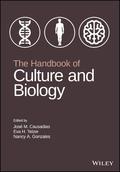The Handbook of Culture and Biology

1. Auflage November 2017
560 Seiten, Hardcover
Wiley & Sons Ltd
Kurzbeschreibung
Research into the links between culture and biology has the potential to transform our understanding of the role of nature and nurture in shaping evolution, adaptation, and development. For researchers in this area, culture and biology are two domains of equal importance and constant coevolution. Exploring this emerging and interdisciplinary field for the first time, The Handbook of Culture and Biology examines how researchers are defining how cultural and biological processes have evolved together in humans and animals, how they influence each other, and how this relationship shapes typical and atypical development.
A comprehensive guide to empirical and theoretical research advances in culture and biology interplay
Culture and biology are considered as two domains of equal importance and constant coevolution, although they have traditionally been studied in isolation. The Handbook of Culture and Biology is a comprehensive resource that focuses on theory and research in culture and biology interplay. This emerging field centers on how these two processes have evolved together, how culture, biology, and environment influence each other, and how they shape behavior, cognition, and development among humans and animals across multiple levels, types, timeframes, and domains of analysis.
The text provides an overview of current empirical and theoretical advances in culture and biology interplay research through the work of some of the most influential scholars in the field. Harnessing insights from a range of disciplines (e.g., biology, neuroscience, primatology, psychology) and research methods (experiments, genetic epidemiology, naturalistic observations, neuroimaging), it explores diverse topics including animal culture, cultural genomics, and neurobiology of cultural experiences. The authors also advance the field by discussing key challenges and limitations in current research.
The Handbook of Culture and Biology is an important resource that:
* Gathers related research areas into the single, cohesive field of culture and biology interplay
* Offers a unique and comprehensive collection from leading and influential scholars
* Contains information from a wide range of disciplines and research methods
* Introduces well-validated and coherently articulated conceptual frameworks
Written for scholars in the field, this handbook brings together related areas of research and theory that have traditionally been disjointed into the single, cohesive field of culture and biology interplay.
Foreword: On Culture and Biology xvii
Preface: Why Culture and Biology? xxiii
Part I General Issues in Culture and Biology Interplay
1 Introduction to Culture and Biology Interplay 3
Jose M. Causadias, Eva H. Telzer, and Nancy A. Gonzales
2 Integrating Culture and Biology in Psychological Research: Conceptual Clarifications and Recommendations 31
Moin Syed and Ummul-Kiram Kathawalla
3 Understanding Religion from Cultural and Biological Perspectives 55
Stefanie B. Northover and Adam B. Cohen
Part II Animal Culture
4 Introduction to Animal Culture: Is Culture Uniquely Human? 81
Charles T. Snowdon
5 Comparing and Contrasting Primate and Cetacean Culture 105
Jennifer Botting, Erica van deWaal, and Luke Rendell
6 Cultural Phenomena in Cooperatively Breeding Primates 129
Charles T. Snowdon
Part III Cultural Genomics
7 How Are Genes Related to Culture? An Introduction to the Field of Cultural Genomics 153
Jose M. Causadias and Kevin M. Korous
8 Dual Inheritance, Cultural Transmission, and Niche Construction 179
Michael J. O'Brien and R. Alexander Bentley
9 How the Study of Religion and Culture Informs Genetics and Vice Versa 203
Ronda F. Lo and Joni Y. Sasaki
Part IV Cultural Neurobiology
10 An Introduction to Cultural Neurobiology: Evidence from Physiological Stress Systems 227
Leah D. Doane, Michael R. Sladek, and Emma K. Adam
11 Relations among Culture, Poverty, Stress, and Allostatic Load 255
Stacey N. Doan and Gary W. Evans
12 Biological Consequences of Unfair Treatment: A Theoretical and Empirical Review 279
Anthony D. Ong, Saarang Deshpande, and David R.Williams
13 Cultural Experiences, Social Ties, and Stress: Focusing on the HPA Axis 317
Shu-wenWang and Belinda Campos
14 Cultural Influences on Parasympathetic Activity 345
LaBarron K. Hill and Lori S. Hoggard
15 Neurobiology of Stress and Drug Use Vulnerability in Culturally Diverse Communities 369
EzemenariM. Obasi, Kristin A.Wilborn, Lucia Cavanagh, Sandra Yan, and Ewune Ewane
Part V Cultural Neuroscience
16 An Introduction to Cultural Neuroscience 399
Lynda C. Lin and Eva H. Telzer
17 Neurobiological Causes and Consequences of Cultural Differences in Social Cognition 421
Meghan L. Meyer
18 Culture and Self-Other Overlap in Neural Circuits 443
Michael E.W. Varnum and Ryan S. Hampton
19 Developmental Cultural Neuroscience: Progress and Prospect 465
Yang Qu and Eva H. Telzer
Index 489
Eva H. Telzer is an Assistant Professor of Psychology and Neuroscience at the University of North Carolina Chapel Hill. She researches how cultural processes shape brain development, with a focus on family and peer relationships and long-term psychological well-being.
Nancy A. Gonzales is Foundation Professor of Psychology at Arizona State University. She studies the role of culture in children's development, psychopathology and resilience.


